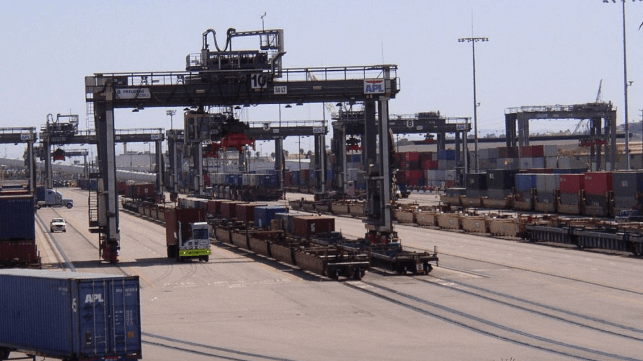Hapag Files FMC Complaint Against CSX in Intermodal D&D Dispute

In the latest twist in the ongoing disputes over D&D fees, the Federal Maritime Commission is now being called on to consider a third-party complaint between Hapag-Lloyd and railroad giant CSX. The shipping company filed a complaint against the railroad as part of its response to an ongoing complaint filed against it by a shipper that claims it was charged D&D fees in violation of the Ocean Shipping Reform Act of 2022.
The case illustrates the complexities emerging in the struggles over D&D fees and the inter-relationship between the various companies in the intermodal transport agreements. The carrier argues in its filing made on April 13 that the FMC has jurisdiction regarding CSX because of the intermodal nature of the shipment and the independence between the carrier’s shipping operations and the rail line’s part of the transport agreement. The shipper argues that the shipment was arranged with Hapag and carried on a single bill of lading making Hapag responsible for the actions of its subcontractor, in this case, CSX. The FMC is being called on not only to decide if the D&D fees were appropriate but where the responsibility lies.
The case stems from a December 2022 complaint filed by a logistics shipping company, M.E. Dey &Co headquartered in Milwaukee, Wisconsin. In their complaint, which was amended in March 2023, the logistic company argues, “The storage and demurrage charges in this action do not serve the FMC’s goal to ensure that detention and demurrage act as a financial incentive to promote the efficient movement
of cargo.” They are demanding relief for a $136,500 charge levied in September and October 2022.
Dey contracted in August 2022 with Hapag for the transport of 16 containers from Rotterdam to Nashville, Tennessee. The containers were embarked in Antwerp, Belgium, and carried by the line’s ships to Charleston, South Carolina. From the port, they were then moved by train to CSX’s rail terminal in Nashville where Dey’s trucker, New Age Logistics, was to receive the containers for their onward journey.
Three of the containers were released to New Age before the last free day but the others remained at the train terminal. New Age says it was informed that the containers were not available because they had not been mounted on a chassis and the trucker was not being allowed to provide its own chassis. It would take a month till October 6 or 7 when all the containers would be released with at different times the trucker saying it was told the containers were not accessible because they were stacked and the continuing issue of getting them on a chassis.
The trucker informed Dey that CSX advised that the reason the chassis were not mounted was due to Hapag’s failure to provide chassis on arrival. They further contend that CSX advised that Dey’s trucker could not come in to recover the containers with its own chassis because the containers were owned by the steamship line. Hapag says that Dey has called CSX unresponsive.
In its third-party complaint, Hapag asserts the D&D fees were assessed, billed, and collected by CSX without Hapag’s involvement or approval. The shipping line further argues that it has waived its demurrage charges which were more than $153,000 that accrued in connection with the containers.
Hapag in its response to the case has denied that the storage charges were unreasonable or unjustified under the Shipping Act, while they are also denying that the containers were unavailable for pickup due to any action or omission by Hapag. While continuing to defend the case, Hapag now argues to the FMC “in the event Hapag is found liable to Dey, CSX is liable to Hapag.”

that matters most
Get the latest maritime news delivered to your inbox daily.
The complexity of the issues under the Shipping Act had already prompted the commission’s Bureau of Enforcement, Investigations, and Compliance to file a motion to intervene. The judge hearing the case granted the motion so the bureau can provide its expertise addressing the Shipping Act and if the actions constitute normal, customary, and continuous practices.
Under the proposed schedule for the case, discovery will take place this summer. After that, it would move to a filing of proposed findings of fact by each side and a response by early November 2023 from Dey to Hapag.
